Discover how Confucius, born in 551 BCE, transformed Chinese society with his profound moral teachings on benevolence, ethical leadership, and filial piety.
Explore the enduring impact of Confucian ideals on China's cultural and governmental framework, offering deep insights into its rich historical and contemporary landscape.
Early Life of Confucius

Born in 551 BCE in the Lu state of China, Confucius's early life was marked by hardship and perseverance, shaping his commitment to moral values. Orphaned at a young age, he faced considerable adversity, which only fueled his determination to rise above his circumstances.
Confucius worked in various government positions, which exposed him to the intricacies of administration and governance. This experience was pivotal, as it provided him with a practical understanding of societal structures.
During his formative years, Confucius developed a profound passion for moral teachings. His dedication to self-improvement led him to study ancient texts and Chinese history meticulously. These studies weren't merely academic exercises but were integral to his quest for wisdom and ethical clarity.
The early life of Confucius is characterized by a relentless pursuit of knowledge and a deep-seated belief in the importance of moral values. These experiences laid the foundation for his later teachings on ethics and social harmony.
Confucius's upbringing in a period of political instability influenced his worldview significantly. His early challenges and experiences underscored the necessity of ethical conduct and social responsibility, which would later become cornerstones of his philosophy.
Key Teachings of Confucius
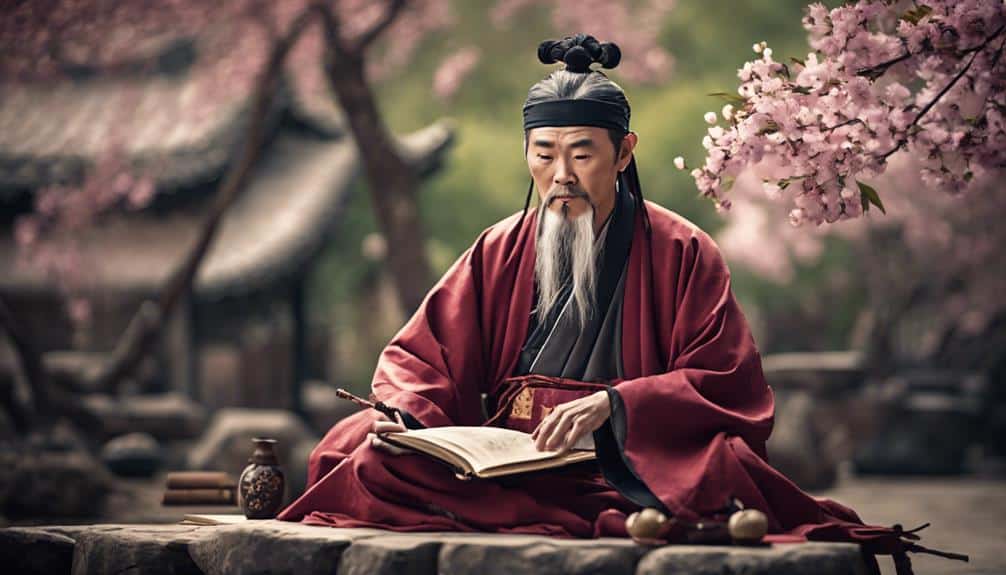
Central to Confucius's teachings is the emphasis on personal and governmental morality, which he believed were essential for achieving a harmonious society. Confucius advocated for the virtue of ren, often translated as 'benevolence' or 'kindness.' He stressed that treating others with compassion and respect is fundamental to moral conduct. Confucius believed that cultivating such virtues at the individual level would naturally extend to the family unit, promoting filial piety, family loyalty, and respect for elders.
His philosophical framework also included the Silver Rule: 'Do not do unto others what you don't want done unto you.' This principle guided interactions and fostered mutual respect within communities. Confucius emphasized that righteousness should guide one's actions, thereby reinforcing social harmony and integrity.
Moreover, Confucius's teachings profoundly influenced Chinese intellectual history and government ethics. By advocating for a morally upright leadership, he asserted that rulers should lead by example, embodying the virtues they wished to see in their subjects. This linkage between personal virtue and effective governance remains a cornerstone of Confucian thought.
Understanding Confucius's key teachings offers valuable insights into the foundations of Chinese culture and the enduring quest for moral and societal harmony.
Confucian Ethics and Morality
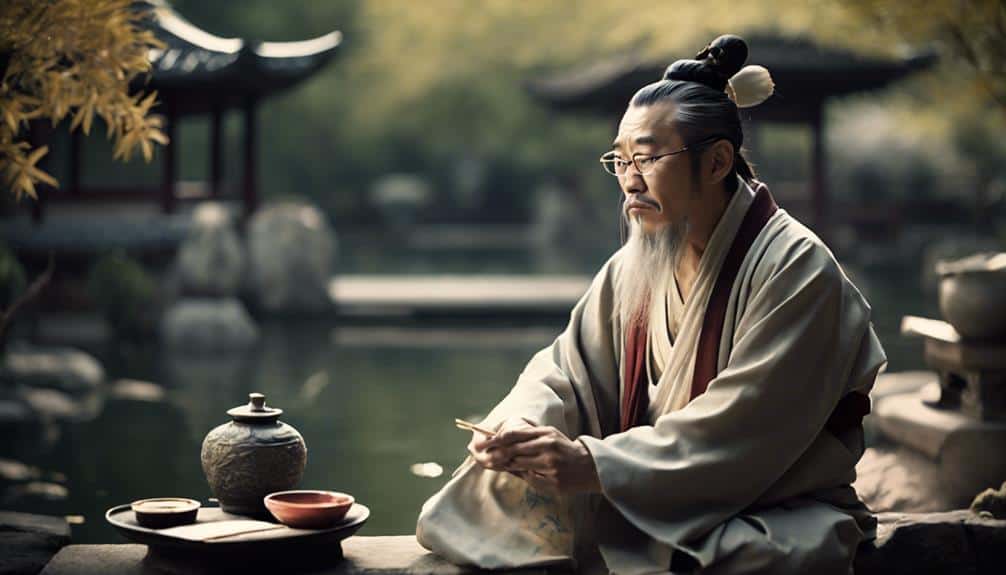
In exploring Confucian ethics, you'll notice a strong emphasis on principles of righteous conduct, guided by the central concept of ren, or benevolence.
Confucius advocates for filial piety and loyalty as foundational virtues, critical for maintaining familial and societal harmony.
Principles of Righteous Conduct
Confucian ethics, rooted in virtues like benevolence, sincerity, and loyalty, provide a comprehensive framework for guiding moral conduct. Central to these teachings is the concept of filial piety, which emphasizes respect and devotion to one's parents and elders. This principle extends beyond family, fostering social harmony by promoting respect and care within the broader community.
Confucius stressed that personal integrity and righteousness are essential for the maintenance of ethical behavior in society. The concept of ren, or humanity, is a cornerstone of Confucian ethics, embodying compassion, empathy, and altruism. By cultivating ren, you can develop a virtuous character that naturally leads to righteous actions.
Practicing rituals and upholding ethical values in daily life are also vital in Confucian morality. These practices help internalize virtues and ensure that moral principles guide your interactions. In Confucian thought, the cultivation of these virtues isn't merely a personal endeavor; it's a societal necessity.
Importance of Ren (Benevolence)
Ren, or benevolence, serves as a fundamental pillar in Confucian ethics, urging individuals to cultivate kindness and empathy for the betterment of themselves and society. Confucius emphasized that embodying ren isn't just an abstract ideal but a practical approach to ethical living. By fostering compassion and understanding, you contribute to creating harmonious relationships, which are the foundation of a stable and prosperous society.
In Confucian thought, benevolence is more than mere emotional kindness; it's a disciplined practice of treating others with respect and sincerity. This virtue demands that you engage in self-reflection and continual moral improvement, ensuring your actions align with the greater good. Practicing ren leads to social harmony by promoting mutual respect and ethical conduct, essential for the well-being of the community.
Confucius believed that cultivating ren was vital for personal moral development. When you embody benevolence, you inspire others to act similarly, thereby creating a ripple effect that enhances collective social harmony. The teachings of Confucius highlight that a society grounded in ren isn't only virtuous but also compassionate, fostering a culture where ethical behavior and empathy are paramount.
Filial Piety and Loyalty
One of the cornerstones of Confucian ethics is filial piety, which mandates a deep-seated respect and unwavering devotion to one's parents and ancestors. This principle isn't merely about obedience but encompasses a broad spectrum of duties that include caring for parents in their old age, honoring their legacy, and performing rituals that reflect reverence for one's lineage. By embedding these values, Confucianism seeks to foster a society where individuals understand their roles within the familial hierarchy, thereby promoting social harmony.
Loyalty, another critical tenet, extends beyond the family to include one's community and nation. In Confucian thought, loyalty to family acts as the foundation upon which broader societal responsibilities are built. This loyalty isn't blind but is intertwined with virtue, encouraging individuals to act with integrity and altruism. Such allegiance ensures cohesive and stable communities, as each person prioritizes collective well-being alongside personal interests.
The practice of ancestor worship further underscores the importance of filial piety and loyalty. By honoring ancestors through rituals, you acknowledge their contributions and maintain a tangible connection to your heritage. This continuity of respect and responsibility helps perpetuate a culture of mutual care and societal stability.
Impact on Chinese Society
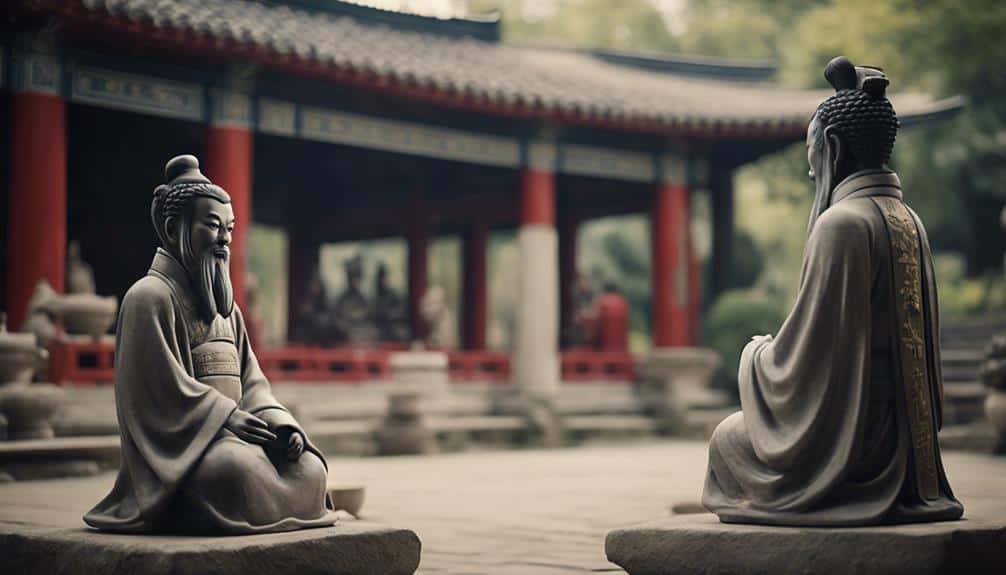
You can see how Confucius' teachings have profoundly shaped Chinese society by fostering cultural and social norms rooted in ethical behavior and respect for tradition.
His principles of filial piety and social responsibility have been integral in establishing ethical governance and community cohesion.
You'll find that these values continue to influence modern Chinese policies, reflecting the enduring impact of Confucian thought.
Cultural and Social Norms
Confucius' teachings have profoundly shaped Chinese cultural and social norms, especially through the promotion of filial piety and respect for hierarchical relationships. By emphasizing these values, Confucius instilled a deep respect for elders and authority, which has permeated Chinese family structures and societal interactions. These cultural norms foster social harmony, ensuring that each individual's role within the family and society is well-defined and respected.
Furthermore, Confucian rituals and ceremonies, such as ancestor worship and family gatherings, play an essential role in maintaining traditions and social cohesion. These practices underscore the importance of respect and remembrance, reinforcing familial bonds and communal ties.
The concept of ren (benevolence) is another cornerstone of Confucian thought, promoting a sense of community and interconnectedness. This principle encourages individuals to act with kindness and consideration towards others, thereby enhancing social harmony. Ren fosters an environment where humility, sincerity, and altruism aren't just ideals but practical standards of conduct.
Ethical Governance Principles
The ethical governance principles rooted in Confucian philosophy profoundly transformed Chinese political and social landscapes by prioritizing moral virtues over rigid legalism. Confucius thought emphasized governing through moral leadership, where rulers were expected to embody virtues like benevolence and righteousness. This approach fostered a society where ethical governance was paramount, and social responsibility became a cornerstone of daily life.
You'll find that Confucian ethics encouraged leaders to inspire their subjects through virtuous actions rather than through strict legal codes. This shift had several significant impacts on Chinese society:
- Moral Leadership: Leaders were seen as role models, embodying and promoting ethical behavior.
- Social Responsibility: There was a heightened sense of duty towards community and family, promoting altruism.
- Policy Influence: Government policies were shaped to reflect Confucian values, aiming for societal harmony and stability.
- Cultural Integration: Confucian ethics permeated arts and social structures, reinforcing the importance of moral virtues.
Confucianism in Government
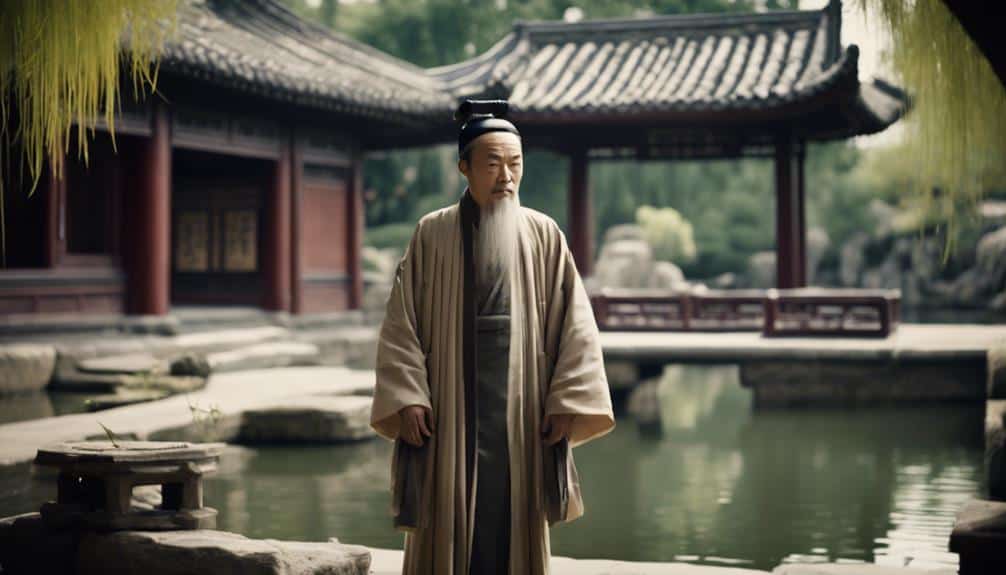
In examining the influence of Confucianism on government, one finds a profound emphasis on leaders embodying ethical principles to foster societal harmony and collective well-being. Confucianism prioritized social responsibility, urging rulers to act with ethical behavior and serve as paragons of virtue. This approach aimed to inspire citizens and cultivate a society rooted in collectivistic values, where the welfare of the group supersedes individual desires.
Confucius proposed that a leader's moral integrity and ability to act altruistically were more effective than stringent legal codes. By emphasizing culture and tradition, he believed that ethical leadership would naturally encourage citizens to emulate virtuous behavior, thereby maintaining order and stability.
During the Han Dynasty, Confucian principles played a pivotal role in sustaining the empire. The dynasty's governance structure incorporated these collectivistic values, ensuring that social harmony was preserved through respect for hierarchical relationships and familial duties. Confucian ethics extended beyond politics, influencing social structures and even the arts, creating a deeply ingrained cultural ethos that transcended generations.
Mencius and Further Development

You'll find that Mencius's core beliefs build upon Confucian thought by emphasizing human-centered virtues and the intrinsic goodness of human nature.
His political philosophy offers profound insights into governance rooted in benevolence and righteousness.
Exploring Mencius's teachings will enhance your comprehension of Confucian ethics and their broader implications.
Mencius' Core Beliefs
Building on Confucius' foundational teachings, Mencius champions the belief in humanity's intrinsic goodness and the pivotal role of moral cultivation. He asserts that individuals possess an inherent potential for virtues such as benevolence, righteousness, and propriety. To Mencius, ethical leadership is paramount, and he insists that rulers must prioritize the welfare of their people, fostering a just and moral society.
Mencius' core beliefs can be distilled into several key points:
- Innate Goodness: Mencius argues that all humans are born with an inclination toward goodness. This intrinsic virtue can be nurtured through proper moral education.
- Cultivation of Virtues: He emphasizes the need to cultivate virtues like benevolence, righteousness, and propriety, viewing them as essential for personal and societal harmony.
- Role of Government: Mencius advocates for a government that actively promotes the well-being of its citizens, asserting that ethical leadership is vital for a prosperous state.
- Ideal of the Sage Ruler: He envisions the sage ruler as the epitome of ethical leadership, a figure who embodies moral excellence and guides society towards righteousness.
Human Nature Theory
Mencius' assertion of humanity's intrinsic goodness fundamentally reshapes Confucian ethics by highlighting the inherent potential for virtue within every individual. This human nature theory contrasts sharply with more pessimistic views, suggesting that people are born with an innate capacity for kindness and morality.
Mencius, as a key figure in the development of Confucianism, emphasizes that ethical growth and the cultivation of moral character are central to realizing this potential. By promoting the idea that everyone possesses the seeds of virtue, Mencius shifts the focus of Confucianism towards a more optimistic and human-centered approach. He argues that through proper education and self-cultivation, individuals can nurture their innate goodness and achieve moral excellence.
This perspective not only enriches the ethical foundations of Confucianism but also provides a framework for personal development and societal harmony. Understanding Mencius' human nature theory is essential for grasping the deeper principles of Confucian ethics. His teachings encourage you to reflect on your own moral capabilities and the importance of fostering virtues like benevolence, righteousness, and wisdom.
In this way, Mencius' insights continue to influence contemporary interpretations and applications of Confucian thought.
Political Philosophy Insights
Mencius's political philosophy, rooted in the Confucian tradition, underscores the pivotal role of ethical leadership in fostering a just and harmonious society. He built upon Confucius's teachings by emphasizing the cultivation of moral character and the importance of benevolence in shaping virtuous individuals. Mencius believed that leaders must embody ethical leadership to create a society where compassion and righteousness prevail.
Key elements of Mencius's political philosophy include:
- Innate Goodness: Mencius argued that humans are inherently good and capable of moral self-improvement through ethical actions.
- Moral Character: The cultivation of personal integrity and moral character is essential for both leaders and citizens.
- Benevolence and Compassion: A ruler's benevolence is pivotal for the well-being of the people and the stability of the state.
- Ethical Governance: Ethical leadership, grounded in Confucian values, is necessary for a just society.
Mencius's contribution to Confucian thought refined the ethical framework by stressing that genuine benevolence and righteousness are foundational for effective governance. His insights reflect a deep understanding of human nature and underscore the transformative power of ethical leadership in achieving societal harmony.
Rituals and Traditions

In the domain of Confucian rituals and traditions, the emphasis on filial piety, respect for ancestors, and family harmony serves as the cornerstone for cultivating societal virtues. Confucianism places a strong focus on devotion to family through practices that include ancestor worship and honoring elders. Such rituals aren't merely ceremonial but are essential in instilling key virtues like respect, altruism, and humility.
You'll find that traditional Confucian ceremonies mark important life events—births, marriages, and deaths—each imbued with specific protocols that reinforce social norms and proper conduct. These rituals help uphold a societal structure where every individual's role is clearly defined and valued, ensuring that personal actions align with collective well-being.
Central to these traditions is the concept of filial piety, or xiao, which manifests as unwavering respect and care for one's parents and ancestors. This devotion to family extends beyond immediate kin to a broader sense of loyalty and moral responsibility within the community. Etiquette and propriety in interactions are meticulously observed, reflecting a deep-seated belief in the importance of upholding social harmony through disciplined behavior.
In essence, Confucian rituals and traditions provide a framework for moral development and societal cohesion, ensuring that virtues are perpetuated across generations.
Confucian Legacy and Influence
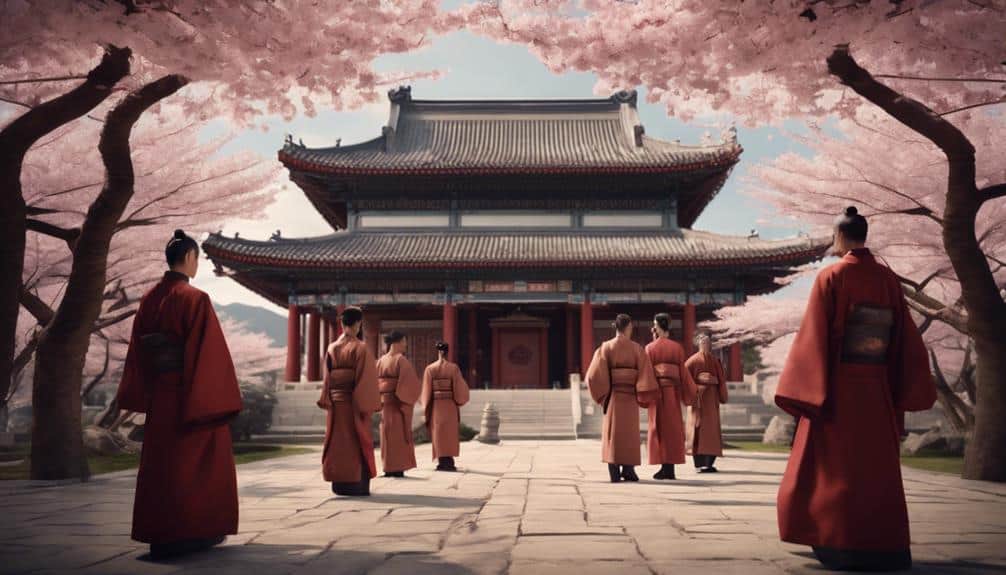
Shaping Chinese society for centuries, Confucius' teachings have profoundly influenced its harmony, virtue, and social order. His philosophy, deeply rooted in ethical behavior and moral values, left an indelible mark on Chinese government, education, and social structure.
Confucius' life was dedicated to propagating his vision of a society governed by virtue and righteousness. You can observe his teachings' impact through many aspects of Chinese history:
- Government: Confucianism became the official state ideology under Emperor Wu Di of the Han Dynasty, ensuring that governance was aligned with ethical principles.
- Education: Confucian texts became core educational materials, emphasizing the importance of learning and moral development.
- Social Structure: His teachings promoted a hierarchical yet harmonious society, where each individual's role was clearly defined.
- Cultural Identity: The blend of Confucian ideas with Buddhist and Taoist principles during the Song Dynasty, known as Neo-Confucianism, further enriched Chinese cultural and philosophical thought.
Confucius' life and profound teachings continue to shape the moral and ethical foundation of Chinese society. His legacy is more than just historical; it's a living, breathing part of China's identity, influencing countless generations. Understanding this legacy offers invaluable insights into the core values that have guided one of the world's oldest continuous civilizations.
Confucianism in Modern Times

Although centuries have passed since Confucius first articulated his teachings, Confucianism continues to wield significant influence in modern Chinese society, permeating its social values, ethics, and governance.
Today, you'll find Confucian principles deeply integrated into the Chinese education system, where respect for elders, filial piety, and moral character are emphasized. These values aren't just academic; they shape the very fabric of social interactions and community dynamics.
Confucian rituals and ceremonies remain an integral part of family life and community events. These practices reinforce a sense of continuity and tradition, serving as a living attestation to Confucianism's enduring relevance. For instance, rituals surrounding ancestor worship and significant life events are imbued with Confucian ethics, promoting harmonious relationships and social cohesion.
Moreover, the teachings of Confucius continue to inspire scholars, policymakers, and individuals seeking ethical guidance. In governance, Confucian ideals often inform policy decisions, emphasizing benevolence and moral rectitude. The stress on harmonious relationships and personal growth resonates strongly in contemporary Chinese society, where the quest for a balanced and ethical life remains paramount.
Consequently, Confucianism's influence persists, shaping modern China's social and ethical landscape.
Confucian Philosophy and Happiness

As modern Chinese society continues to be influenced by Confucian values, understanding how these teachings frame the concept of happiness provides profound insights into the philosophy's enduring appeal. In Confucianism, happiness is intrinsically linked to harmony and benevolence. True happiness arises not from individual pursuits but from ethical relationships and moral self-improvement.
Confucian philosophy emphasizes that happiness stems from a deep concern for others, known as 'Jen' or benevolence. This means that personal joy is intertwined with the well-being of those around you.
Harmony, another cornerstone of Confucianism, is achieved through sincerity and ethical conduct, fostering environments where mutual respect and kindness prevail.
Here are four key aspects of how Confucianism ties into the concept of happiness:
- Benevolence: Practicing 'Jen' by showing concern for others.
- Harmony: Achieving happiness through sincere and ethical relationships.
- Self-Improvement: Finding joy in continuous personal and moral development.
- Wisdom and Learning: Pursuing knowledge as a pathway to true happiness.


